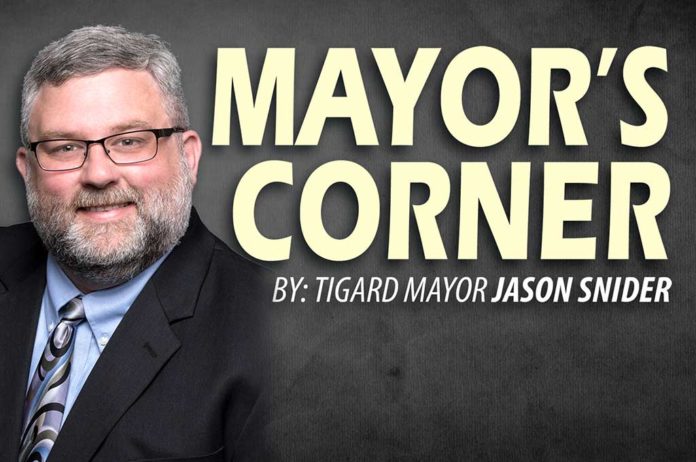Since I challenged Tigard to help eliminate institutional racism within our community, I’ve received a range of responses, from “This is long overdue” to “Racism doesn’t exist.” To that I say, yes, this IS long overdue, and yes, racism DOES indeed exist, here and elsewhere.
Just because you or I have not experienced racism firsthand does not mean we can deny its existence. Years, decades and centuries upon which we can reflect upon prove otherwise. While it might be true that you and I are not personally responsible for what occurred over the last hundred-plus years, it is our responsibility to know what happened in the past (history), and to understand how those actions and decisions have repercussions and effects today.
Every system is perfectly designed to get the results it gets. Unfortunately, discrimination exists in systems that, intentionally or not, protect the well-being, health and wealth of some and systematically hinder these things for others. Examples of such systems include: health care, education, housing, finance and criminal justice – systems that disproportionately disfavor people of color and, even more acutely, Black people.
Embedded racial inequities produce unequal opportunities. Data confirm this fact.
Health:
- Compared with white Americans, Black Americans are 2 to 3 times more likely to die during childbirth.
- Black Americans are dying of COVID-19 at twice the rate of white Americans.
- Nationally, Latinx Americans experience infection at almost 3 times the rate of white Americans and hospitalization rates at nearly 5 times the rate of white Americans. Latinx residents in Washington County make up 15 percent of our population, but account for 54 percent of total COVID-19 infections as of 8/9/20. This is twice the rate of infection for white residents in Washington County.
Education:
- Nationally, predominantly non-white school districts receive $23 billion less than predominantly white districts, despite serving similar numbers of students.
- In the 2017-18 school year, the national adjusted cohort graduation rate was 89 percent for white students, 81 percent for Hispanic students, 79 percent for Black students, and 74 percent for American Indian/Alaska Native students.
Housing/Home Ownership:
- A Black family earning $157K per year is less likely to qualify for a home loan than a white family earning $40K.
- Black Americans experience the highest loan application denial rates. One in 4 Blacks will be denied a conventional loan application, as compared to 1 in 10 whites.
- Owning a home is one of the main ways people build wealth. Nearly 75 percent of white households own their home, compared to 44 percent of Black households.
Wealth:
- As of 2016, the average Black American family had a total wealth of $17,600 – about one-tenth the wealth of the average white American family, which stands at $171,000.
- The typical Black household earns a fraction of the typical white household – just 59 cents for every dollar.
Public Safety:
- The rate of fatal police shootings among Black Americans was much higher than that of any other ethnicity.
- Black Americans are 2.5 times more likely than whites to be killed by police.
Racial inequality has become normalized in our society. Silence is not an option. Inaction is morally unacceptable.
This is a pivotal time in our country. We need to seize this moment and create momentum to change our systems and get better results. When I see facts – such as those I mentioned above – I am compelled to act, and that is what I am doing.
Maya Angelou once said, “Do the best you can until you know better. Then when you know better, do better.”
I have been learning, and I now know better – and that is why I am committed to doing better. This is not easy work, but it is necessary. This journey to eliminate racism and ensure equity will be difficult and awkward, and we will stumble. But not trying is far worse.
I urge you to join me on the journey. On the city’s YouTube channel – Racial Equity playlist, begin (or continue) learning by watching videos, including REAL Action: Advancing Racial Equity in Local Government and Race in Oregon History: A Historical Perspective.
Learning from others is also a part of the journey. The Racial Unity Book Club offers this opportunity. Members are reading books such as So You Want to Talk About Race (2018) by Ijeoma Oluo and The Narrative of the Life of Frederick Douglass (1845) by Frederick Douglass, and hosting virtual discussions about what they’re learning.
Whether one-on-one or in a group, I welcome the chance to discuss our city’s journey with you. I can be reached at jason@tigard-or.gov or via phone (503) 810-0269. I also invite you to participate in this month’s Virtual Fireside Chat on Thursday, Sept. 3, at 6:30 p.m. on Facebook Live.




















